Special Report
Cities With the Absolute Worst Traffic in the World
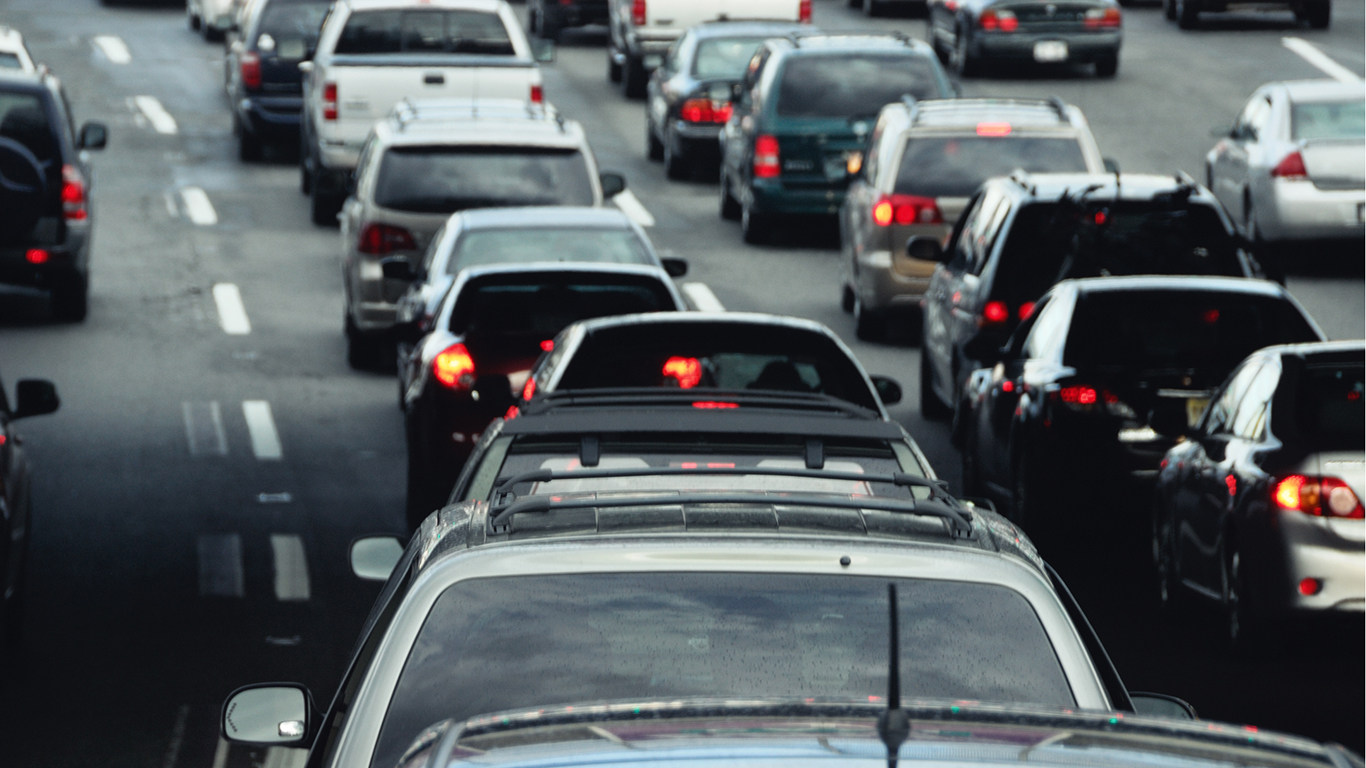
Published:
Last Updated:

While Americans may think traffic in the U.S. is bad, only two U.S. cities are among the 25 worst in the world for traffic.
The average American loses 97 hours a year to traffic congestion. But this is not much compared with drivers in some cities in Europe and South America. And, contrary to what most Americans may think, Los Angeles is not among the worst 25.
Yes, LA’s roads are very busy throughout the day, but the city’s peak traffic severity is not as bad as it is in the two U.S. cities that made the list. In those cities, however, low traffic times are much less congested than LA’s frequently busy roadways.
On average, the costs of congestion in the United States amount to about $87 billion a year, or $1,348 per driver.
In densely-populated cities, residents tend to drive at low speeds (because of congestion) and for shorter distances than residents in low-density cities, where people are able to drive faster but travel longer distances. Globally, European cities are among the slowest. A big reason for these low speeds is the typically narrow streets and complex road networks.
To identify the 25 cities with the worst traffic in the world, 24/7 Wall St. reviewed data from INRIX Research, a global transportation intelligence company. To rank the most congested cities, INRIX’s 2018 Global Traffic Scorecard uses several metrics, including the average number of hours drivers wasted in traffic during times of peak hours, year-over-year change of the previous measure, and the time it took to drive a mile in the inner city. The report examines traffic and mobility trends in more than 200 cities across 38 countries.
Click here to read about cities with the absolute worst traffic in the world.
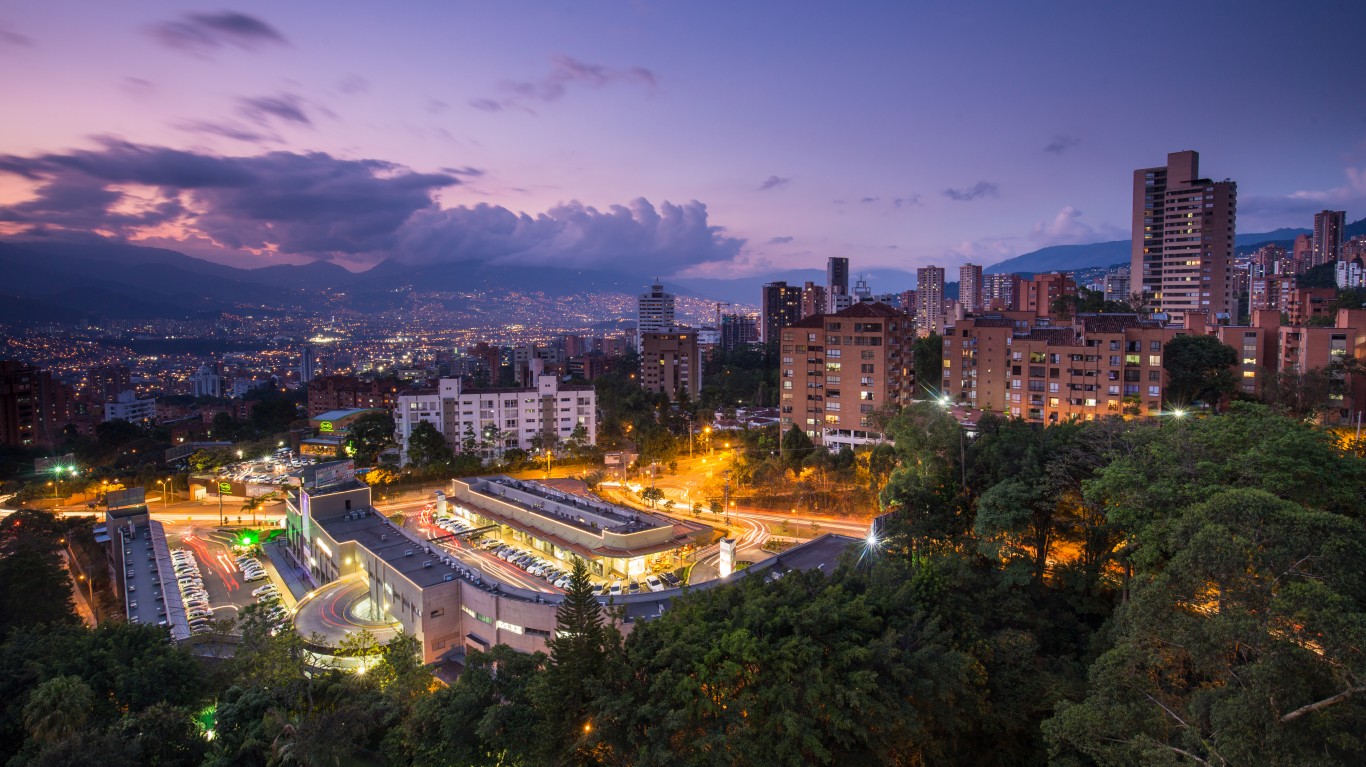
25. Medellin, Colombia
Traffic in Medellin is so bad, it takes six minutes to drive a mile — that’s an average speed of 10 mph. Locals who drive waste about 138 hours a year sitting in traffic. The city’s smog problem has become a serious concern. Air pollutants don’t have a way of leaving the city because of its geography — Medellin is located in a valley with mountains surrounding it.
[in-text-ad]
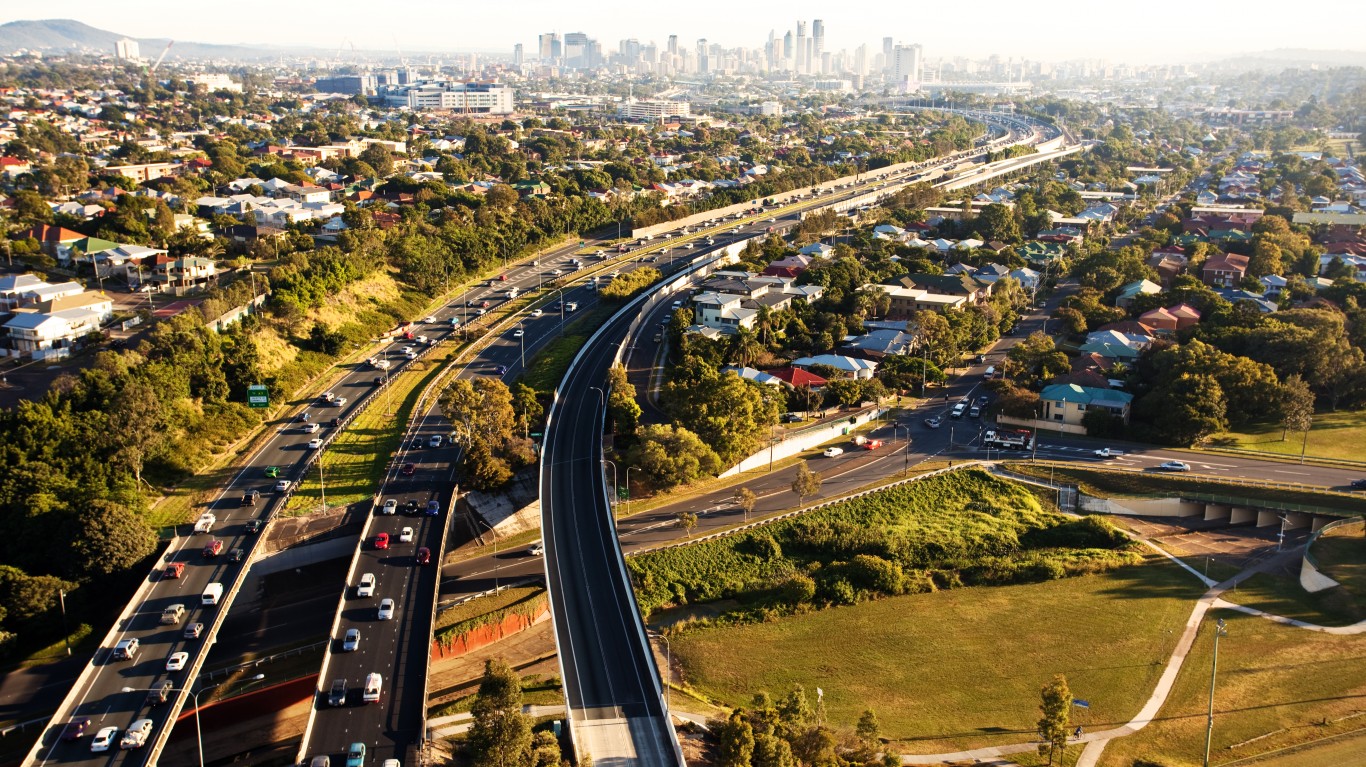
24. Brisbane, Australia
The traffic congestion rank of the capital of the Australian state of Queensland has fallen since 2017, when the city ranked 26th worst. The fastest speed residents can drive in the inner city is about 11 mph.
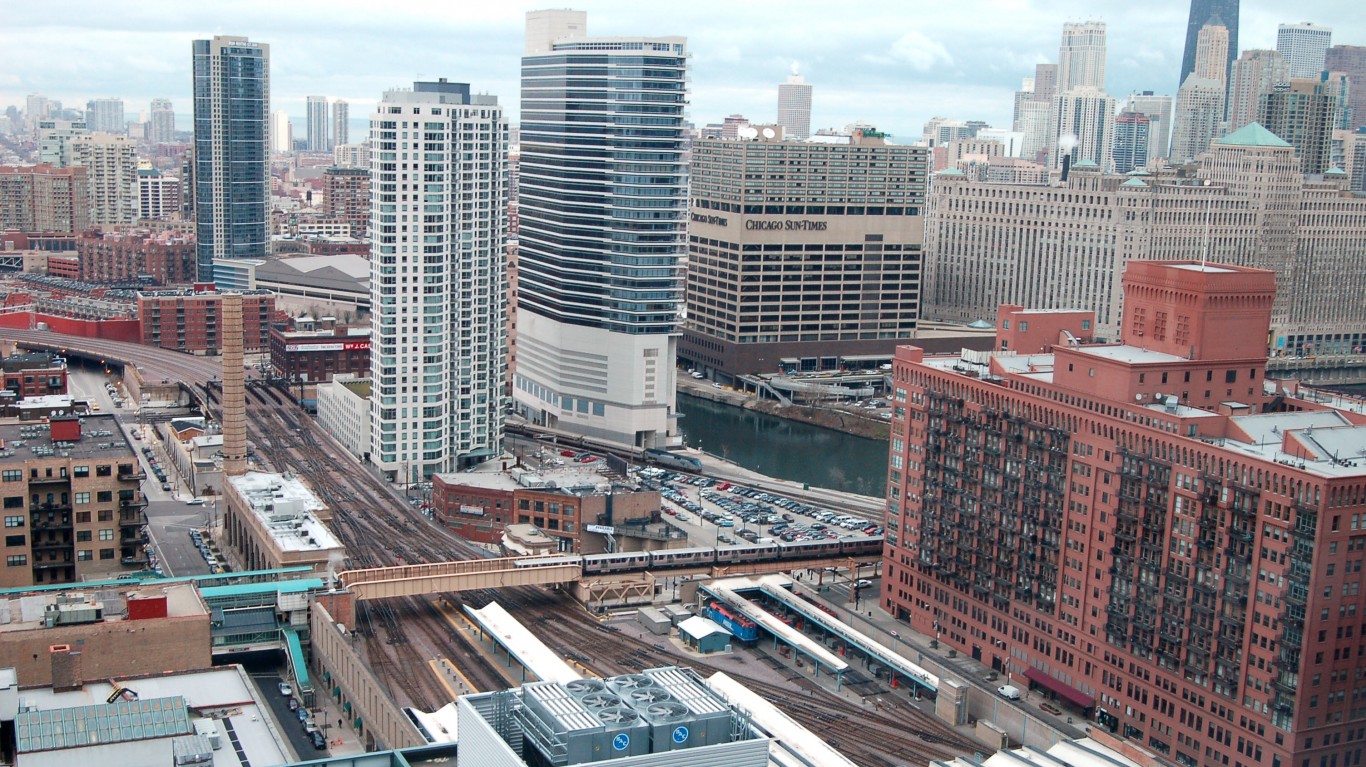
23. Chicago, Illinois
Congested roads, streets, and highways trap Chicago commuters for about 138 hours out of the year in their barely moving cars. A 2016 study by the American Highway Users Alliance found a stretch of the Kennedy Expressway to be the worst bottleneck in the U.S.
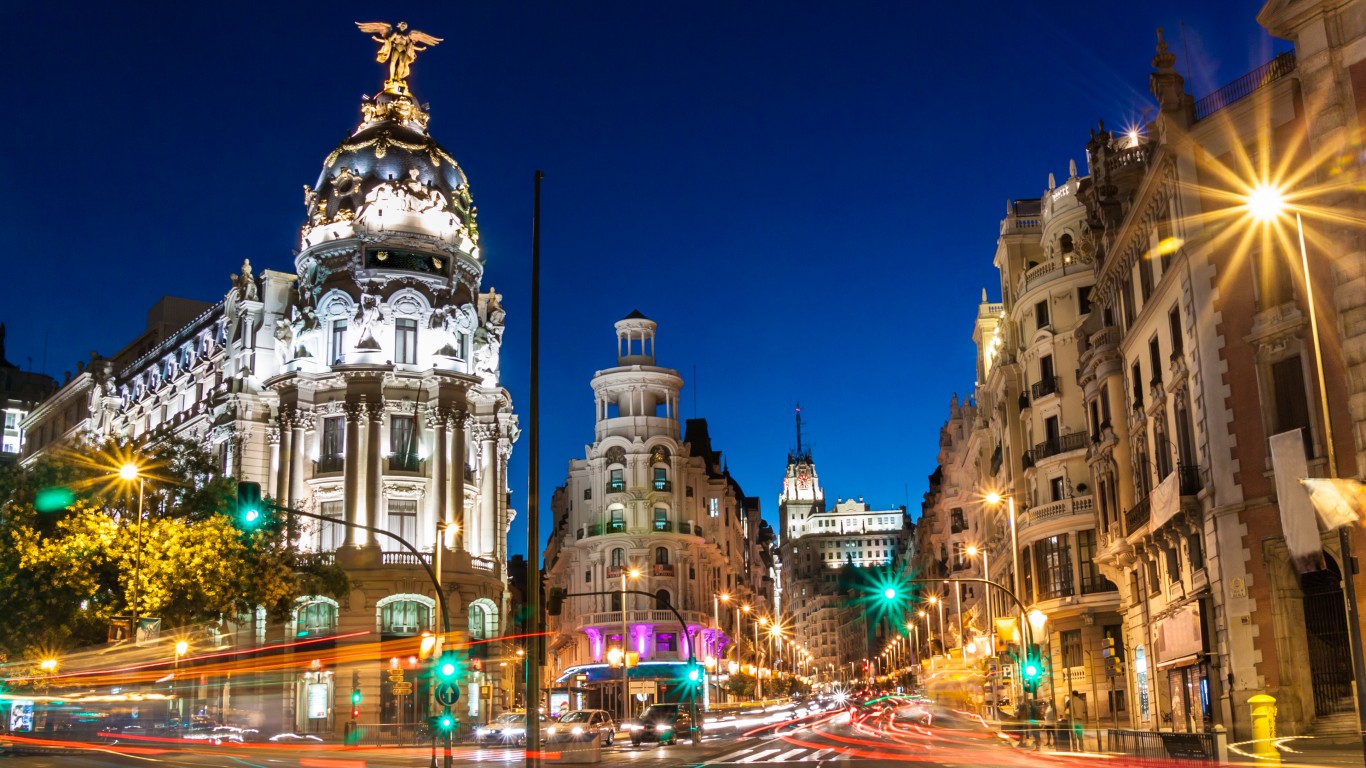
22. Madrid, Spain
Residents of the Spanish capital take about seven minutes to drive a single mile during peak hours. With residents losing about 130 hours in traffic, local officials demanded and advocated for policies that favor public transport, cycling, and walking. A ban on polluting cars has reduced traffic by a third in some of Madrid’s areas.
[in-text-ad-2]
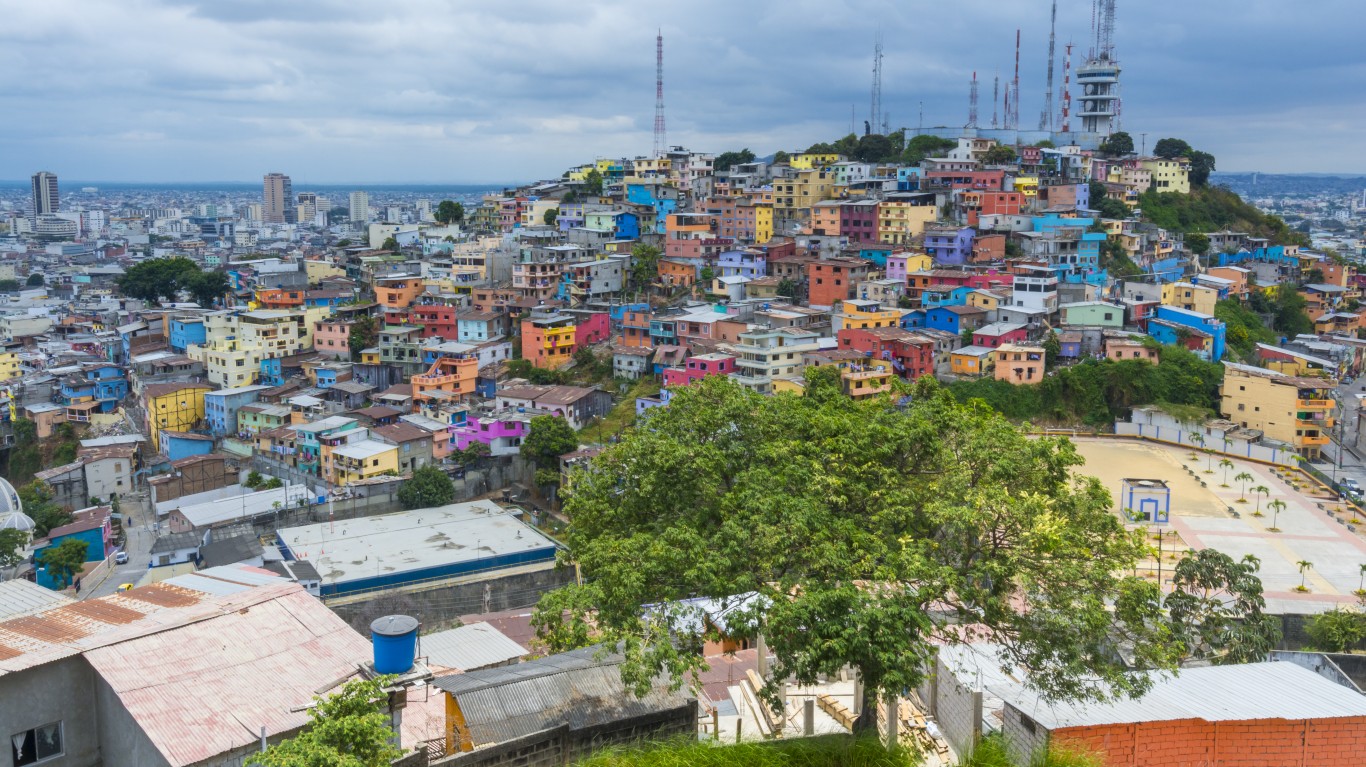
21. Guayaquil, Ecuador
Ecuador’s most populous city has a serious problem with traffic. Residents waste as many as 167 hours a year just sitting in traffic. Numbeo, a crowd-sourced global database, estimates that almost 60 trees are needed to neutralize the amount of cardio dioxide produced by each car passenger a year.
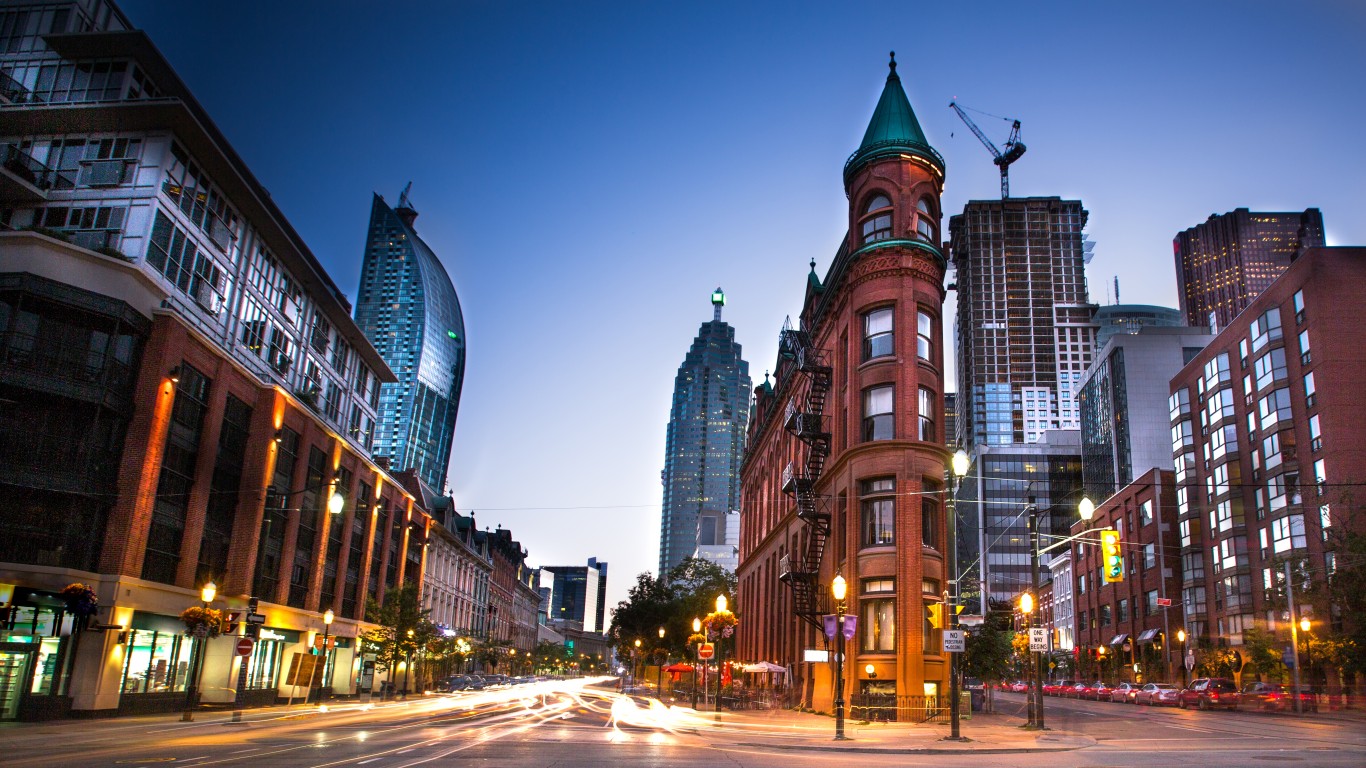
20. Toronto, Canada
Toronto has the worst traffic in Canada. Local drivers take about 10 minutes to drive a single mile during peak hours. People spend over three hours a week in congestion. There have been suggestions to control traffic flows through adaptive traffic signals and with road congestion pricing strategies.
[in-text-ad]
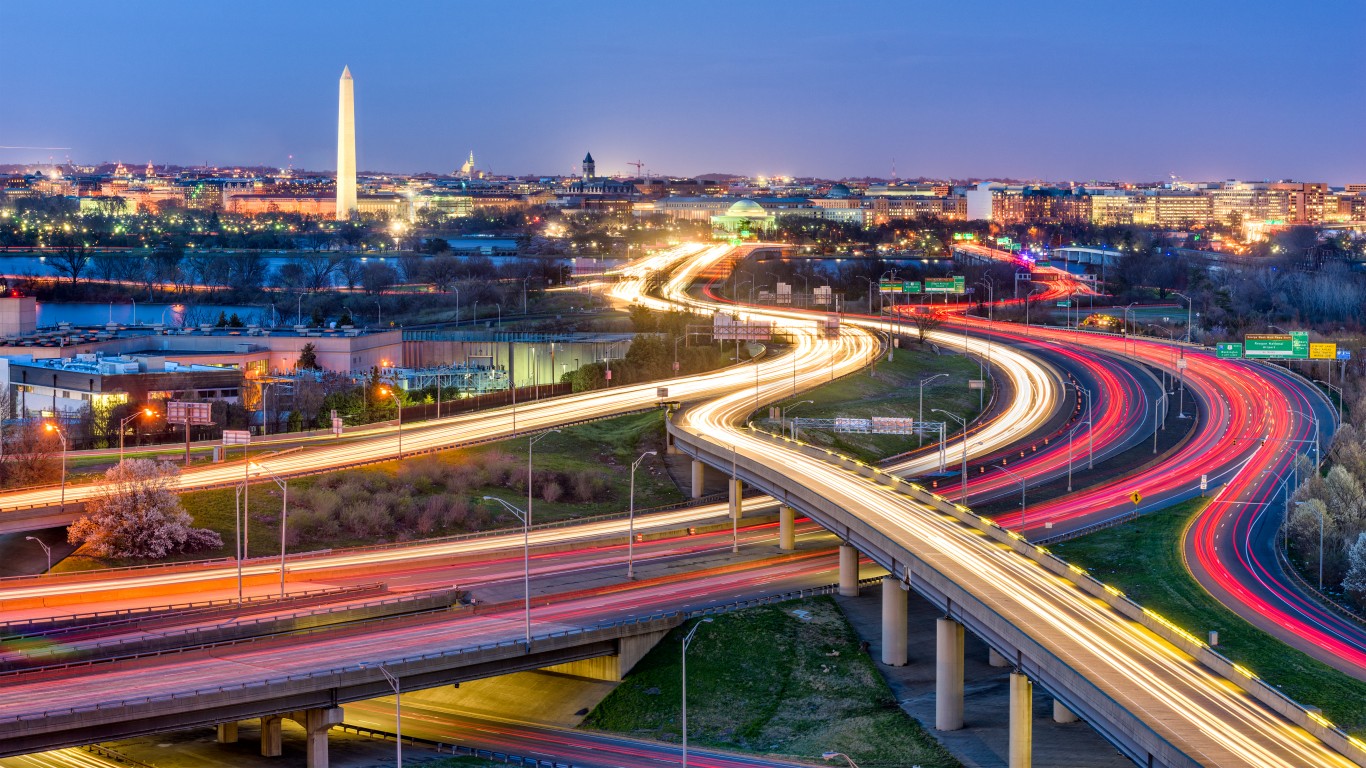
19. Washington, District of Columbia
The United States’ capital is the city with the second worst traffic in the country. Drivers in D.C. lose 155 hours, the total equivalent of about a week, dealing with slow-moving traffic. Local drivers lose up to $2,161 per year due to congestion, according to the Department of Transportation.
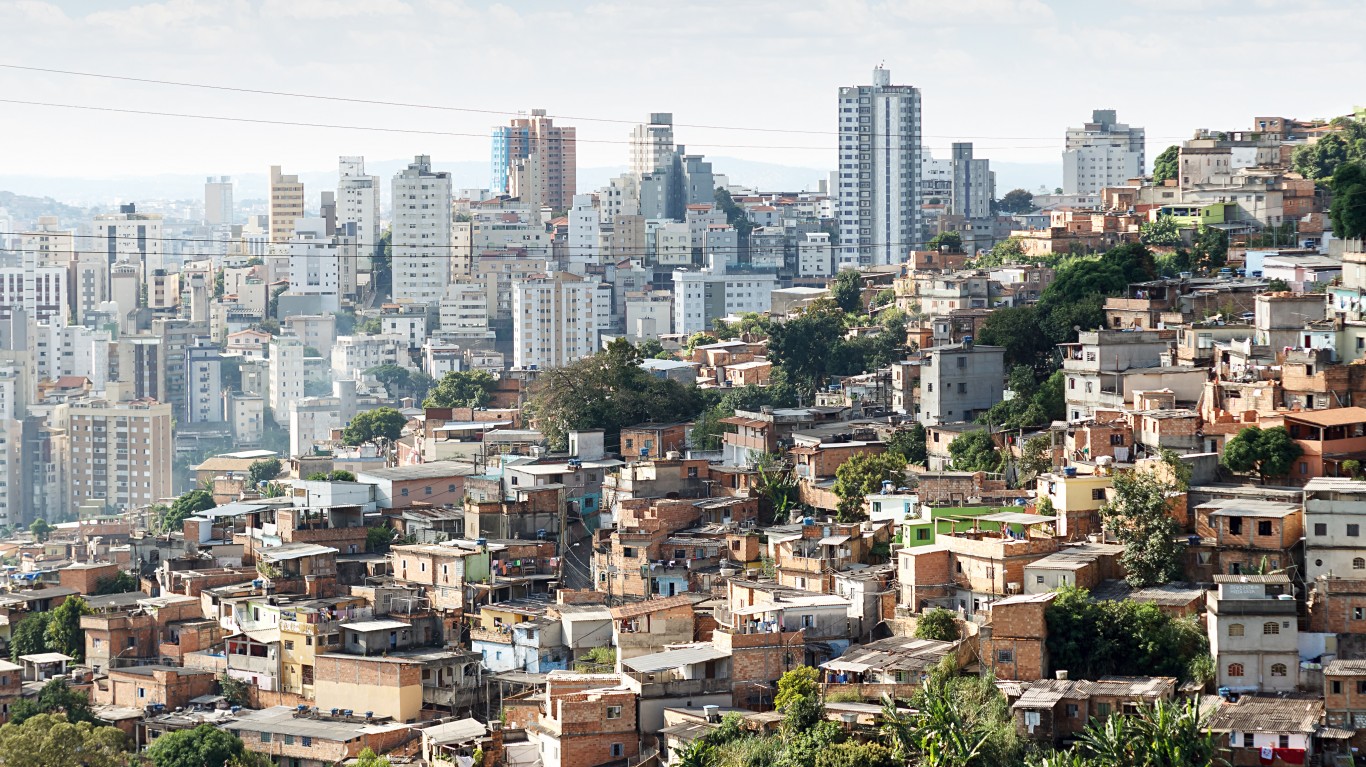
18. Belo Horizonte, Brazil
Belo Horizonte residents who drive lose 202 hours per year — more than eight days — due to traffic congestion, the 11th worst in the world. The congestion rank of the city, known for its huge soccer Mineirão Stadium, has gotten worse since 2017, when Belo Horizonte was ranked 22nd.
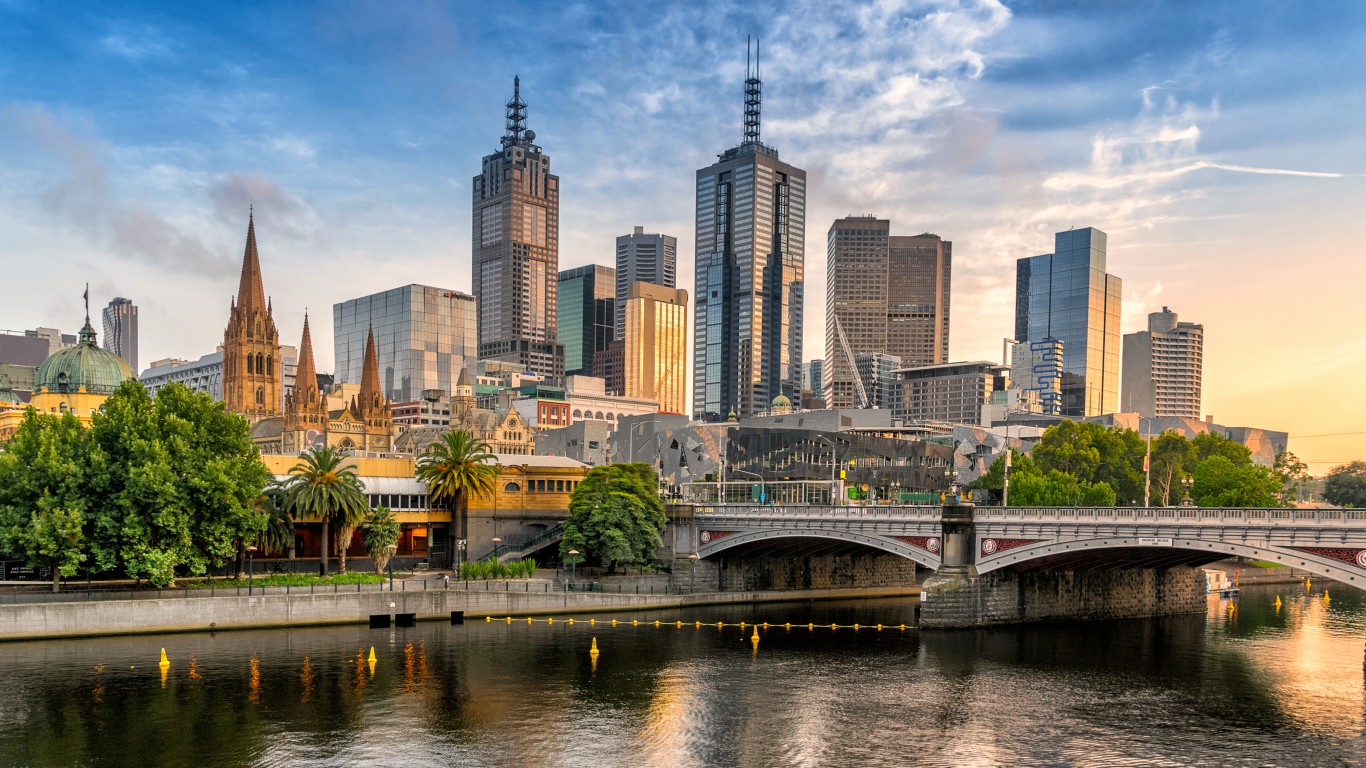
17. Melbourne, Australia
Melbourne often ranks among the best cities in the world in different categories — happiest and most livable for a few years in a row. But locals who drive on a regular basis may have something to say about that. It takes them about 11 minutes to drive a mile during peak hours. Drivers lose nearly five days a year sitting in traffic, though it’s a 13% improvement from 2017.
[in-text-ad-2]
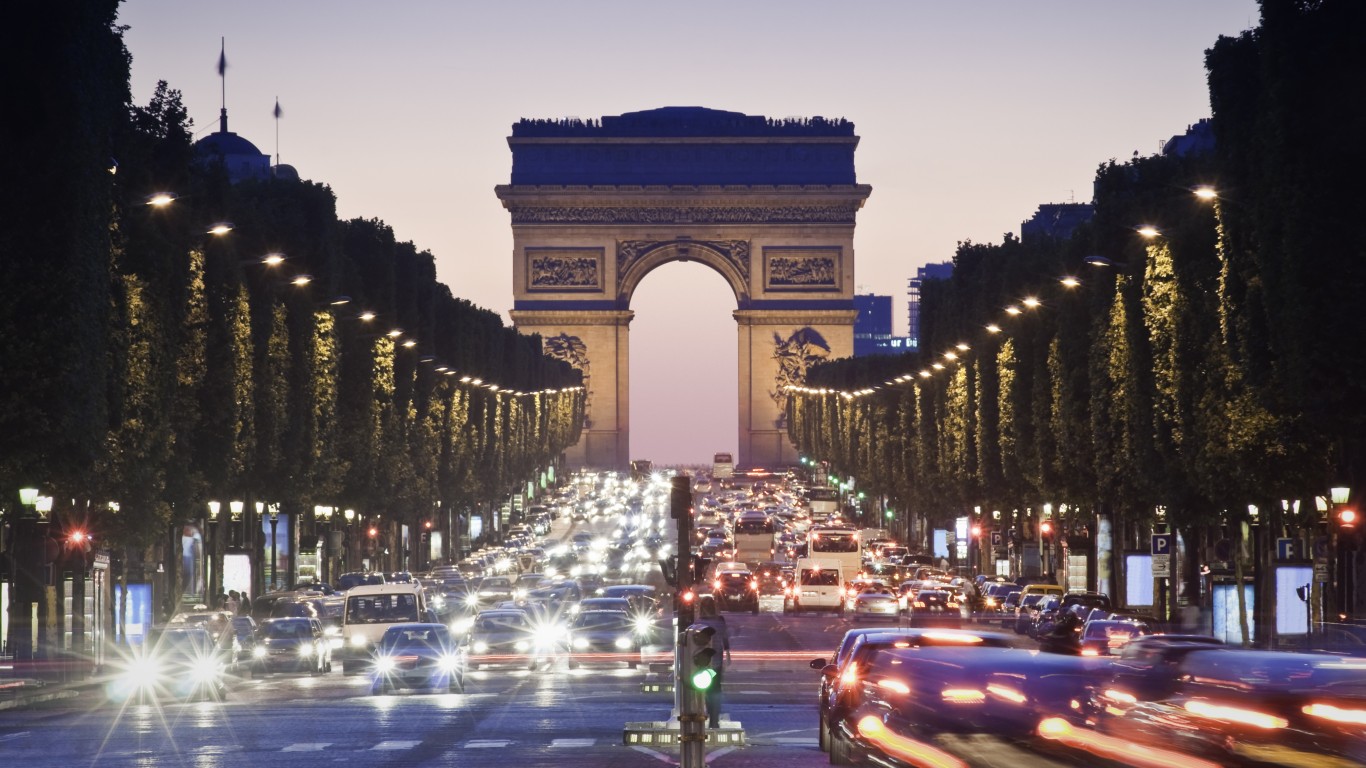
16. Paris, France
Being among the most visited city in the world comes with pros and cons. A big factor in the congestion problem in the French capital is the age of the roads. Many date back to Roman times. As a result, cars can drive on roads that have been basically designed for horse carriages and walking. Drivers in Paris lose 237 hours a year — almost 10 days — sitting in traffic, the fifth most in the world.
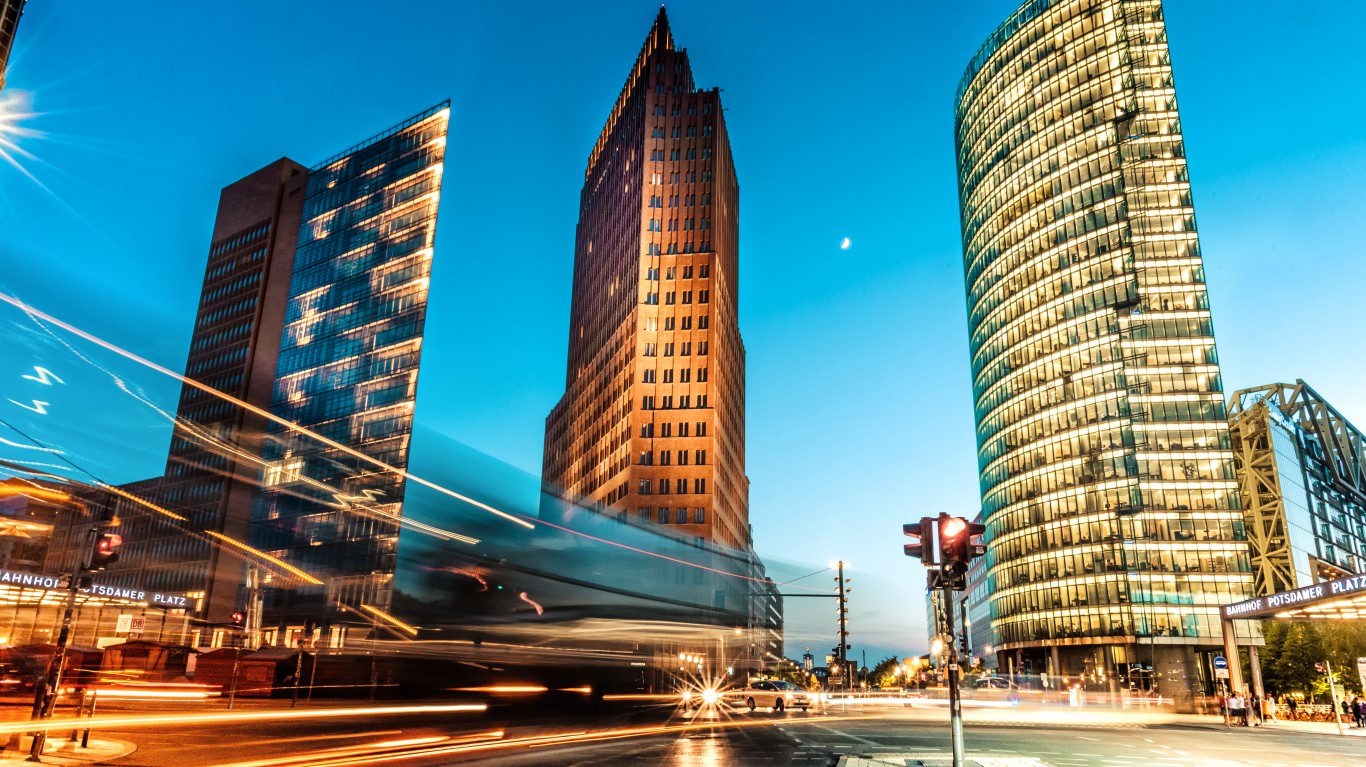
15. Berlin, Germany
Berlin is the most congested city in Germany. Drivers lose 154 hours a year just sitting in their cars waiting to move. The average speed in the inner city is 11 mph. Congestion costs each driver over $1,500 a year.
[in-text-ad]
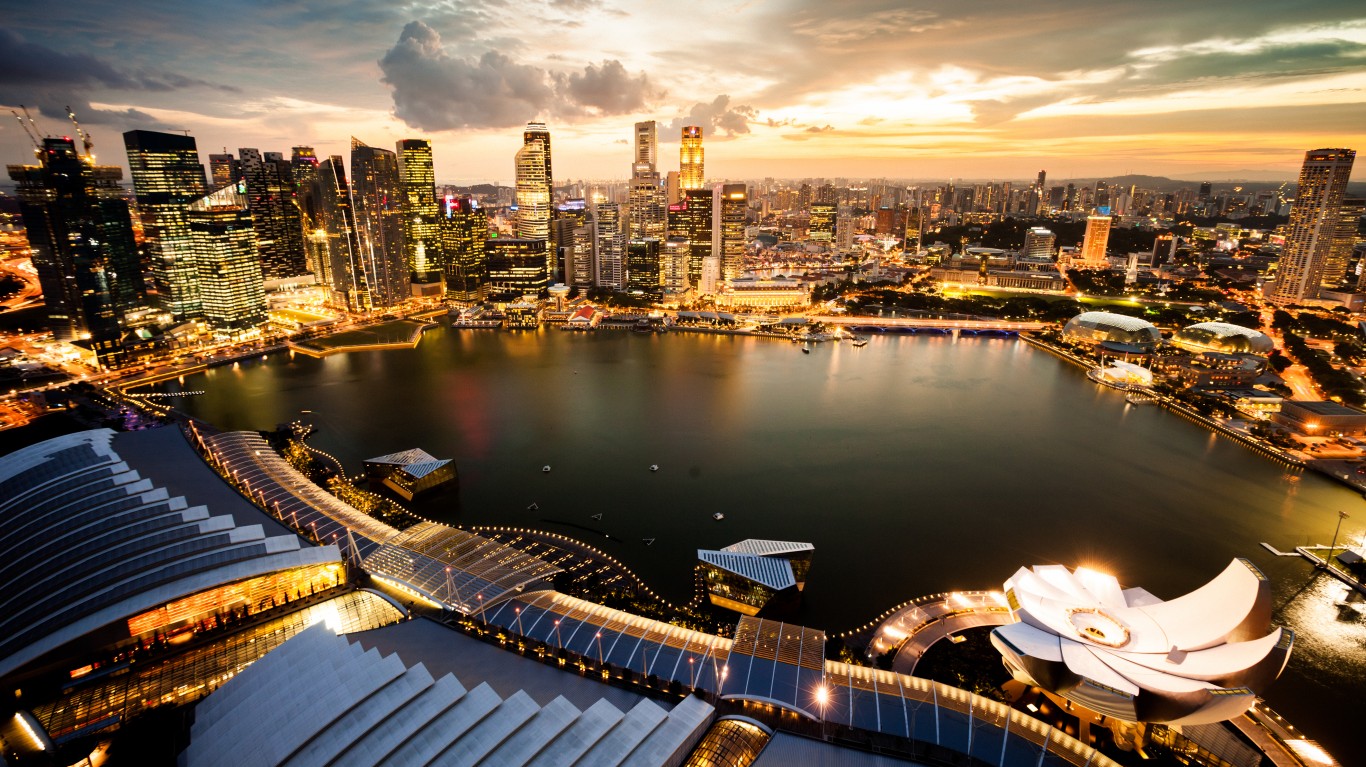
14. Singapore
The island city-state was the first place to implement congestion tolling, or electronic road pricing — cars don’t stop to pay tolls. Singapore enforces strict anti-congestion policies, including high vehicle ownership fees. In 2017, Singapore announced that it won’t be adding new cars to its roads starting that year, and that it will keep the commercial vehicle growth rate at a very low 0.25%.
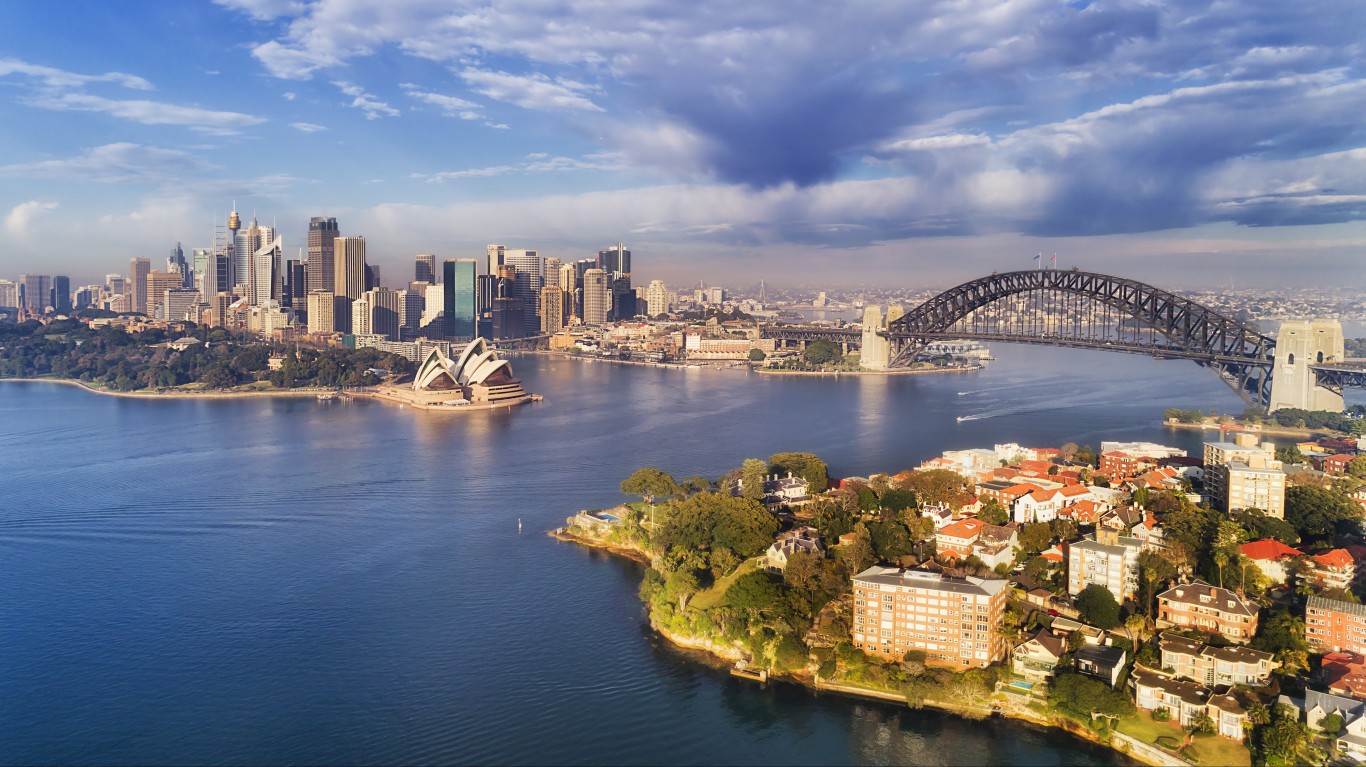
13. Sydney, Australia
The worst traffic in Australia is in Sydney, where more than 4.4. million people live, making it the country’s largest city. It takes local drivers six minutes to drive a mile — that’s an average speed of 10 mph.
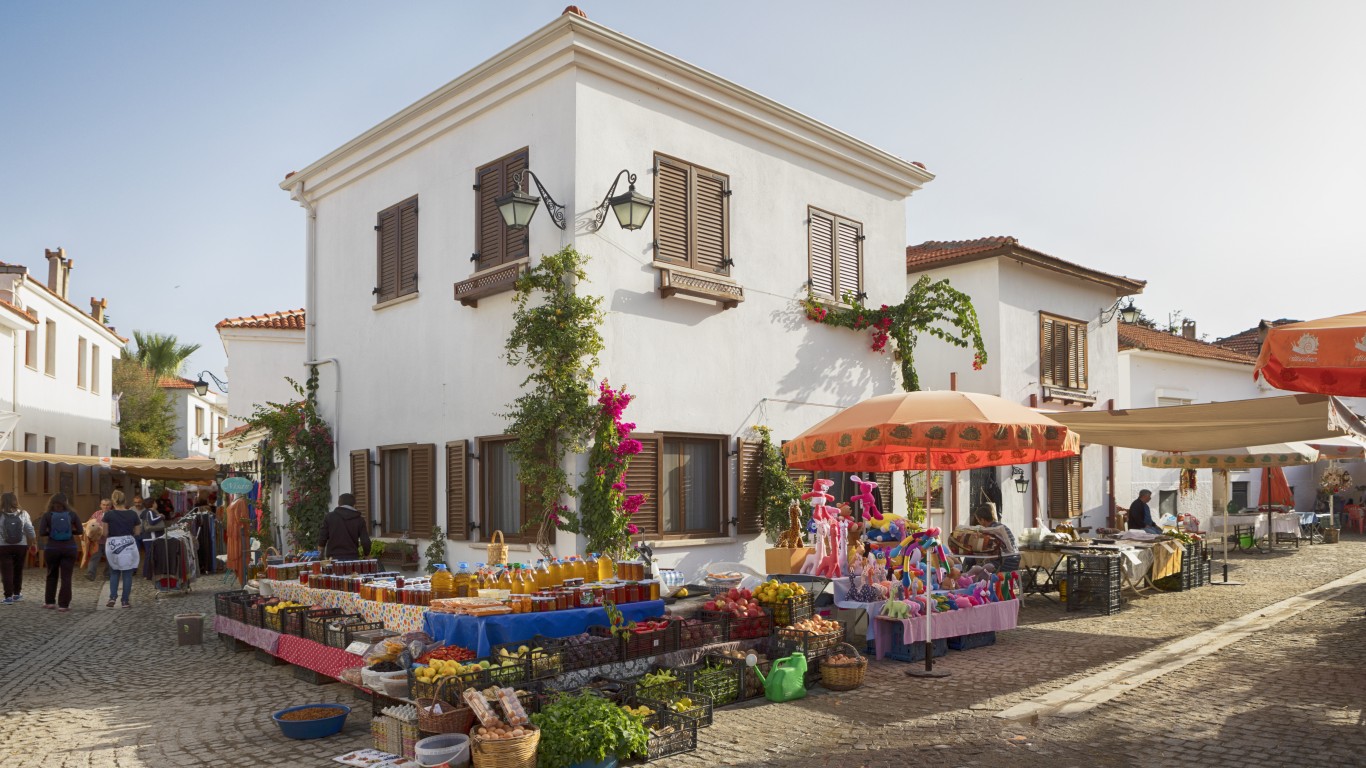
12. Izmir, Turkey
Izmir is the 12th-most congested city in the world, the sixth in Europe, and the third in Turkey. The city and province of 4.3 million people on the Aegean coast is a popular tourist destination, hosting over a million visitors every year, which add to the city’s traffic problems. Drivers spend more than six days of the year sitting in traffic.
[in-text-ad-2]
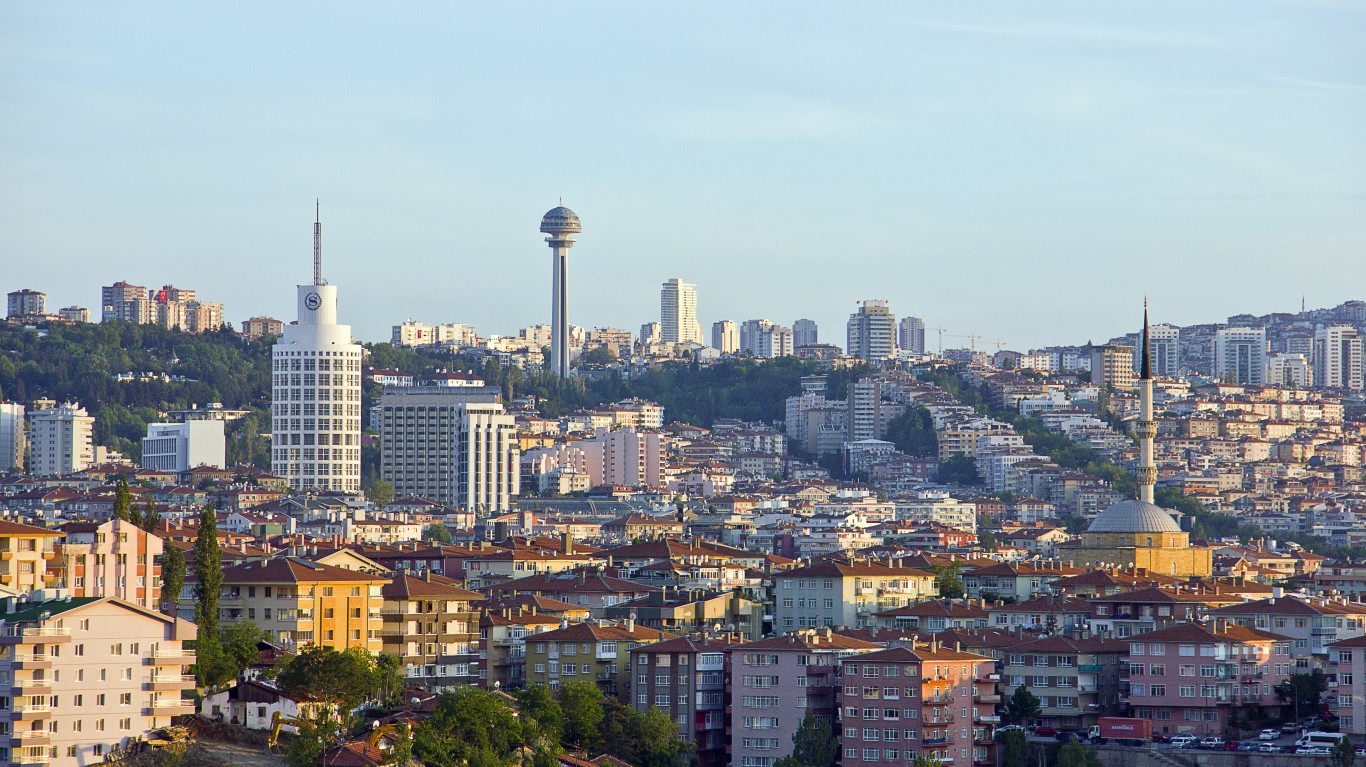
11. Ankara, Turkey
Drivers in the Turkish capital take about five minutes to drive a mile in the inner city, which is a speed of about 12 mph. Numbeo , a crowd-sourced global database, estimates that almost 54 trees are needed to neutralize the amount of cardio dioxide produced by each car passenger a year.
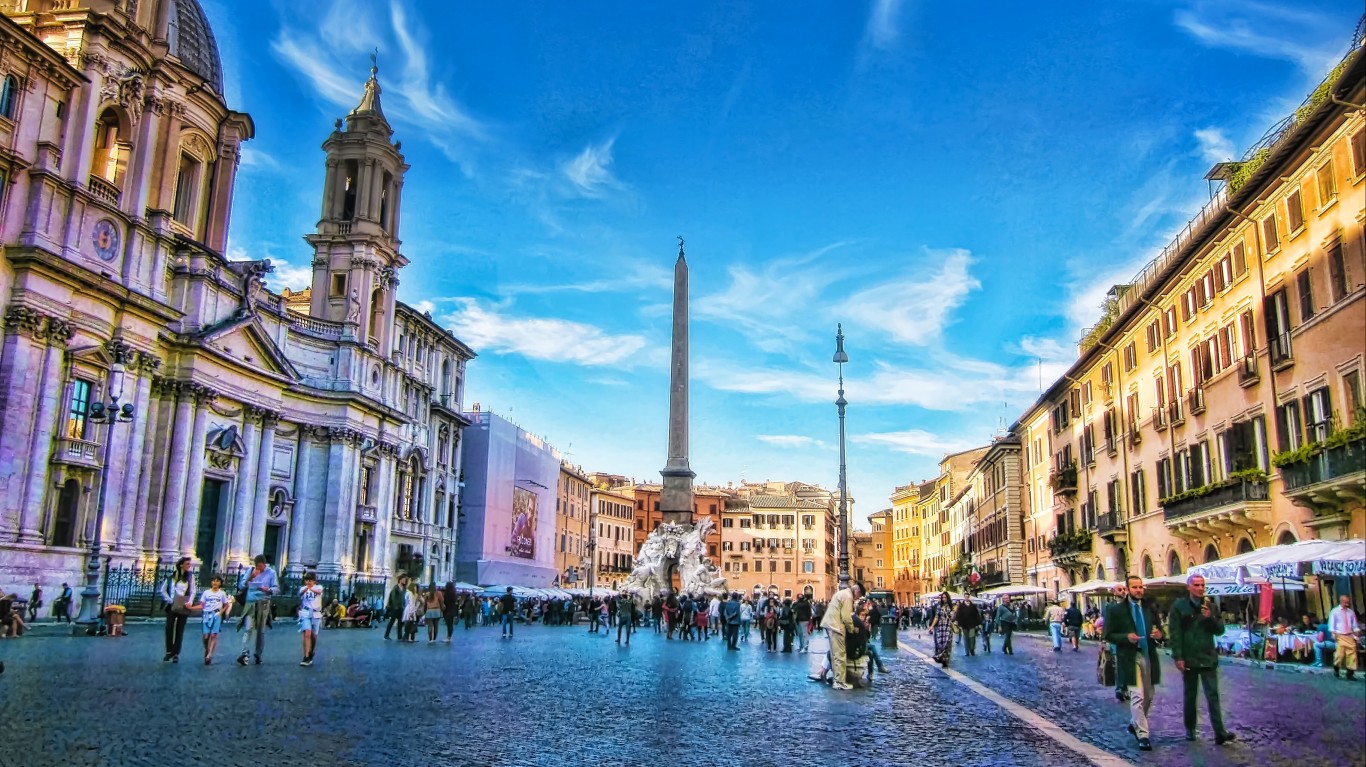
10. Rome, Italy
Rome is the European city with the greatest time lost due to congestion — 254 hours a year, or more than 10.5 days — and the second most in the world. Two major reasons why traffic is such a problem in Italy’s capital are old streets and ring roads, a kind of road that encircles a city, which force traffic into areas with dense public transit.
[in-text-ad]
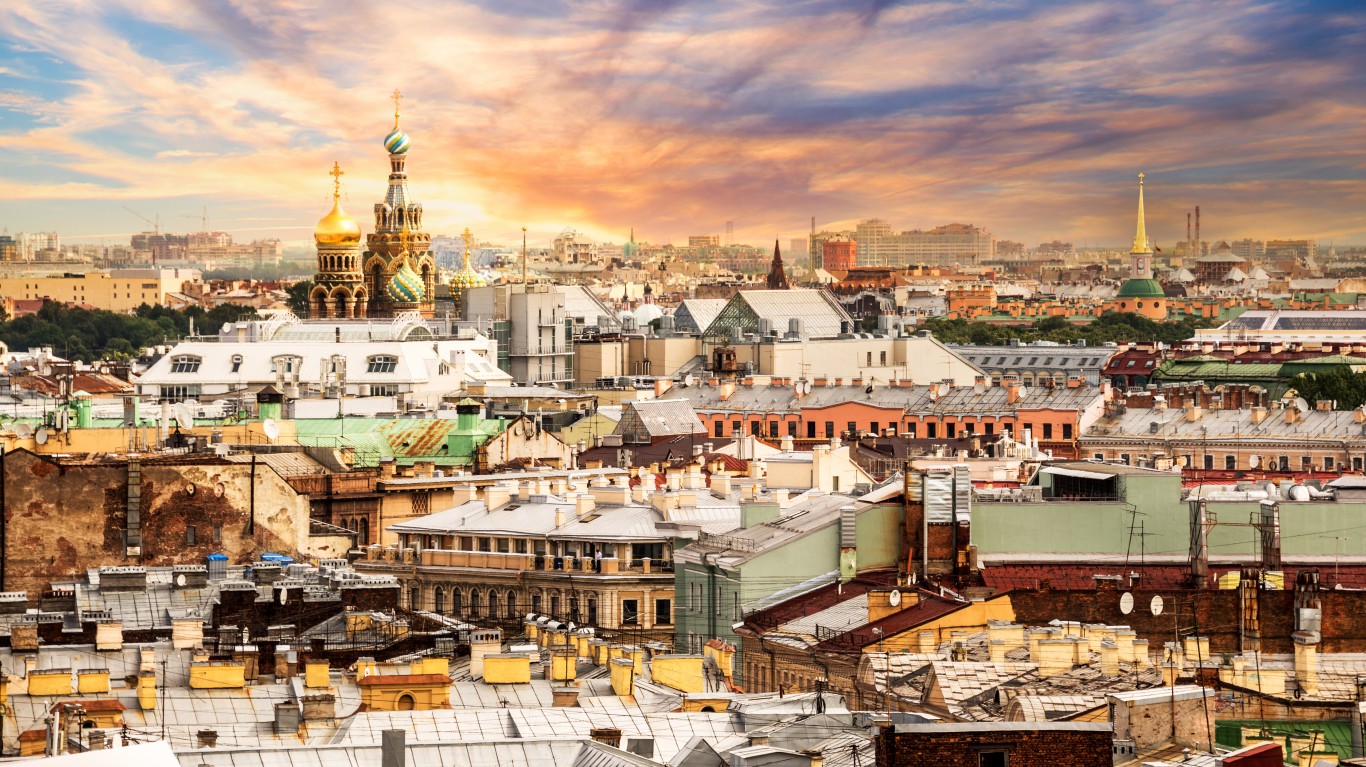
9. Saint Petersburg, Russia
Drivers in Russia’s second-largest city lose about 200 hours, or just over 8 days, a year due to slow-moving traffic. Locals have to allow about 50 extra minutes a day to get to their destination.
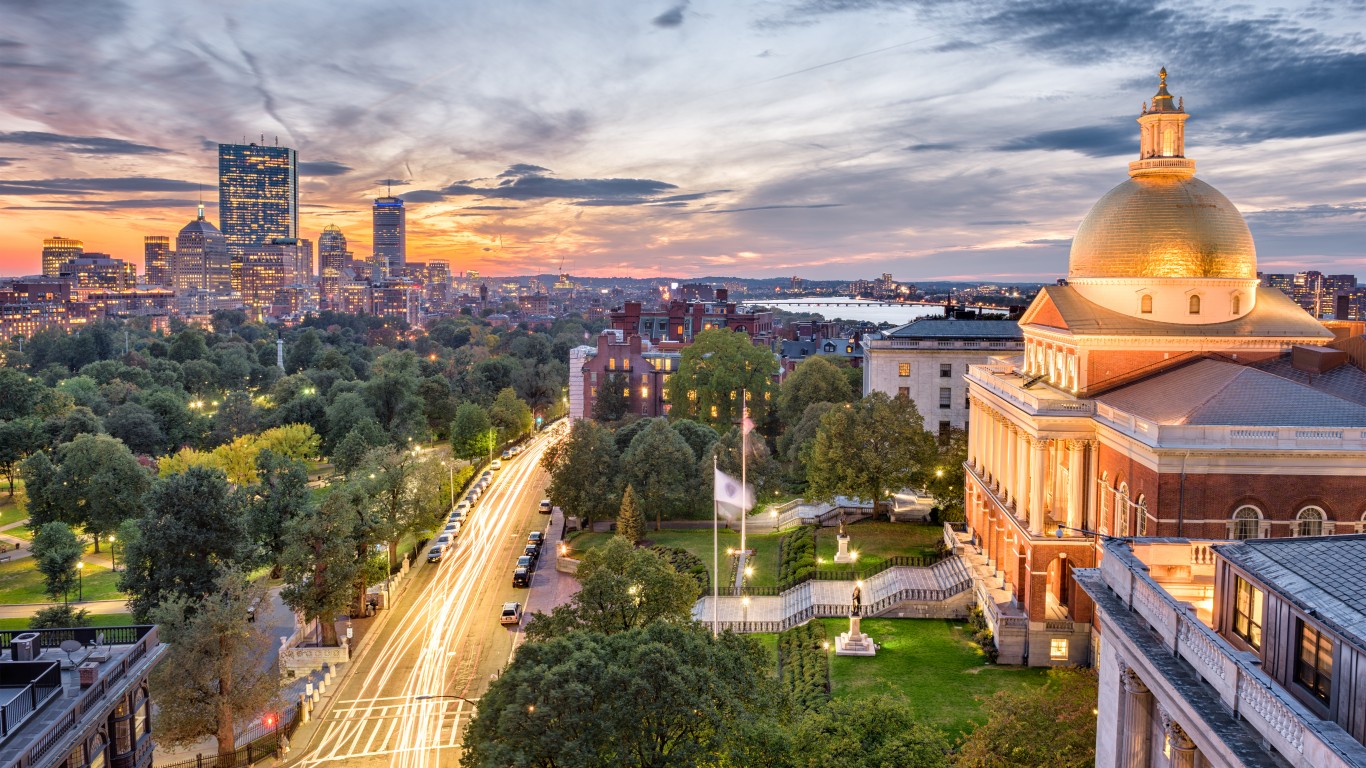
8. Boston, Massachusetts
Boston is the worst-ranked American city when it comes to traffic congestion. Its geography, age, and density have created a road network that just about breaks down when traffic gets bad. The waiting time, while sitting in traffic, is 15 hours more than the next-worst cities in the U.S. in terms of traffic, Chicago and Seattle.
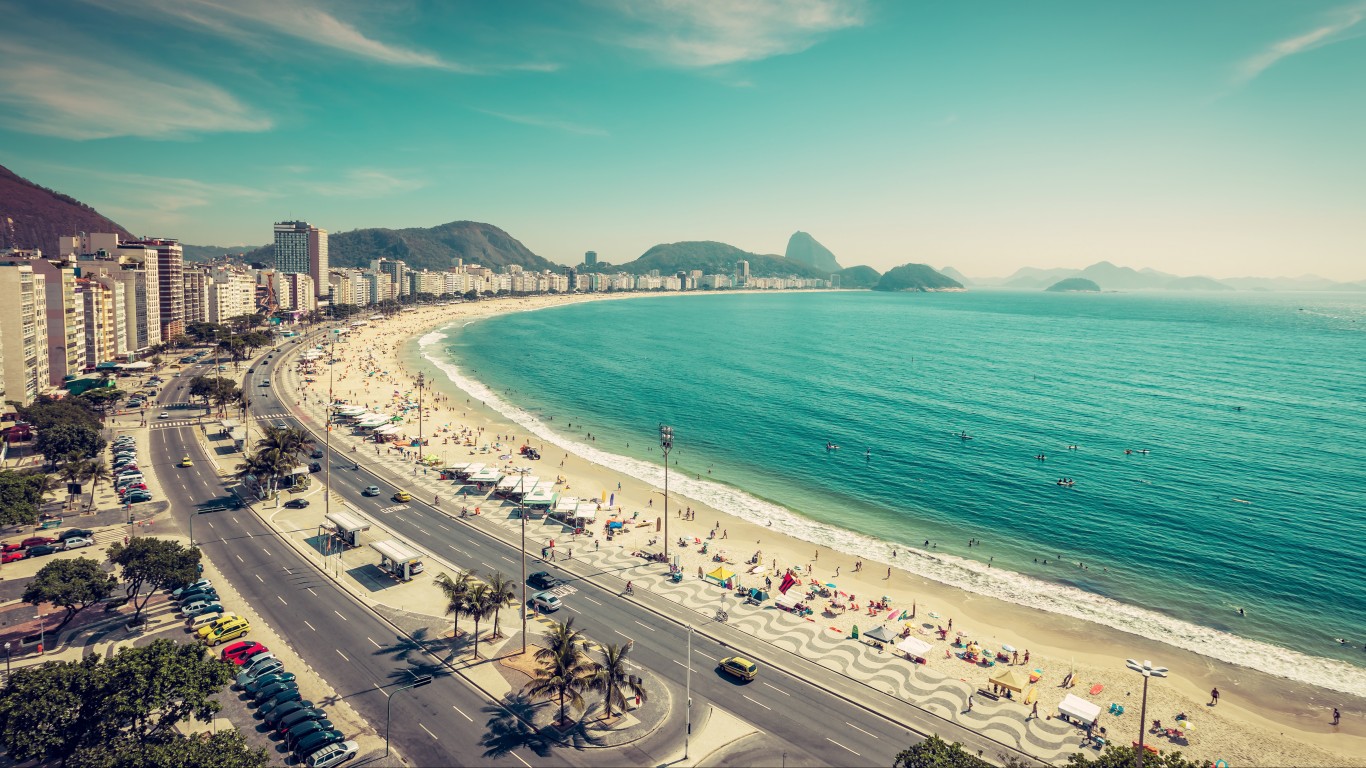
7. Rio de Janeiro, Brazil
The second- most populous city in Brazil, Rio de Janeiro is the third-most congested city in South America. Drivers lose 199 hours a year, or more than a week, a year, waiting in traffic. This is a 15% change for the worse compared with 2017. It takes about five minutes to drive a mile in the inner city, which is about 13 mph.
[in-text-ad-2]
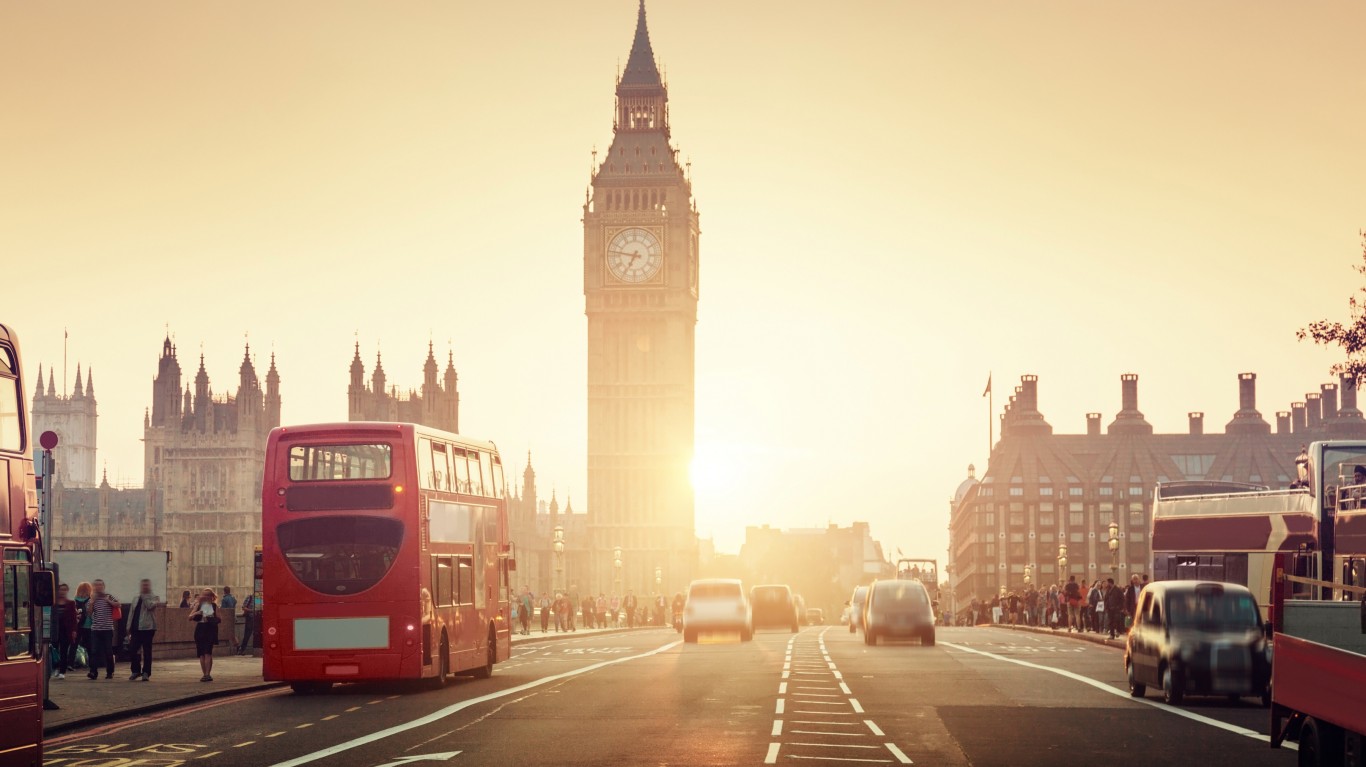
6. London, United Kingdom
London has the sixth-greatest number of hours wasted sitting in traffic, at 227, or about 9.5 days, a year. The costs of the massive delays amount to $2,200 per driver a year. As a result, London has started to make changes in road space allocation towards cycle, pedestrian, and public transport. The city implemented congestion tolling in 2003.
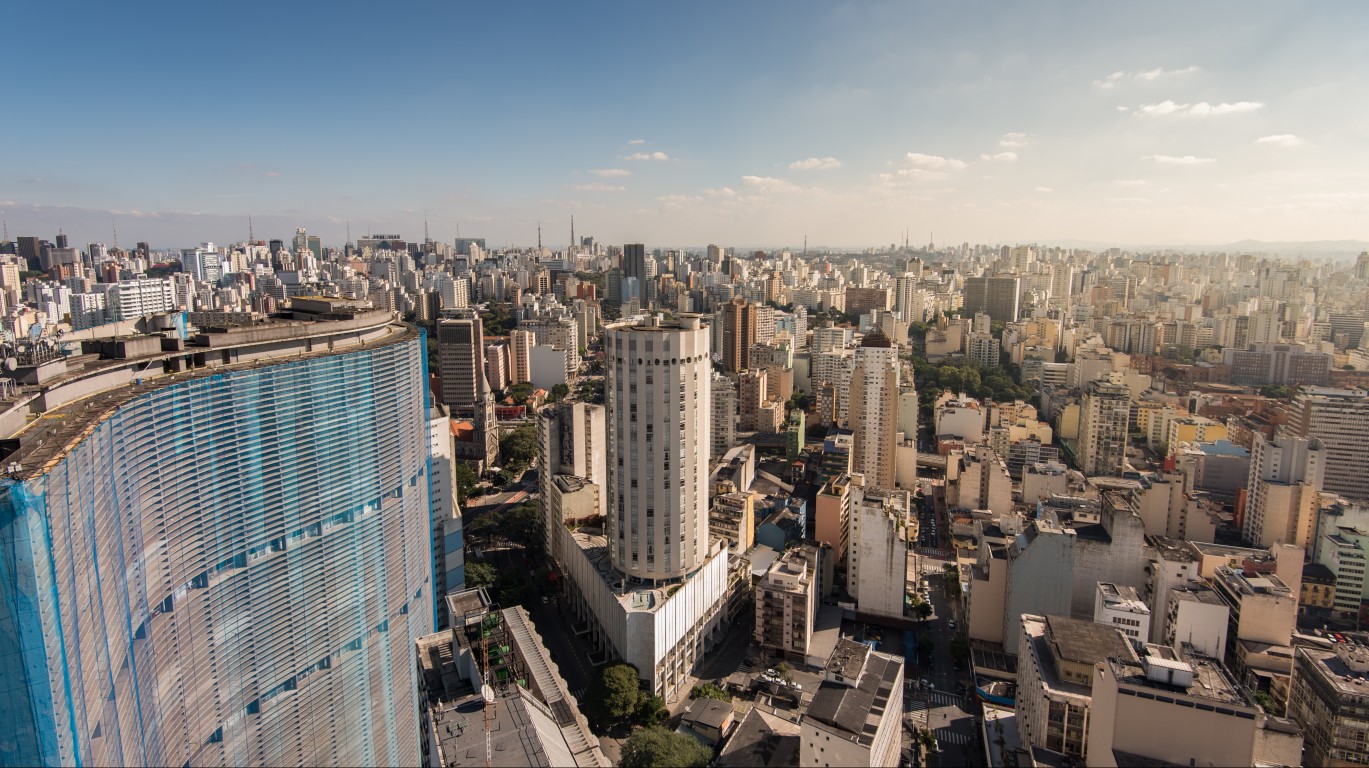
5. Sao Paulo, Brazil
Sao Paulo is the most populous city in Brazil and one of the most populous urban areas in the world. Drivers waste 154 hours a year just sitting in traffic. The fast rate of urbanization, high levels of informal settlements, and unforgiving topographies such as hills, granitic rocks, and plateaus that contribute to the difficulty in improving mobility in the city.
[in-text-ad]
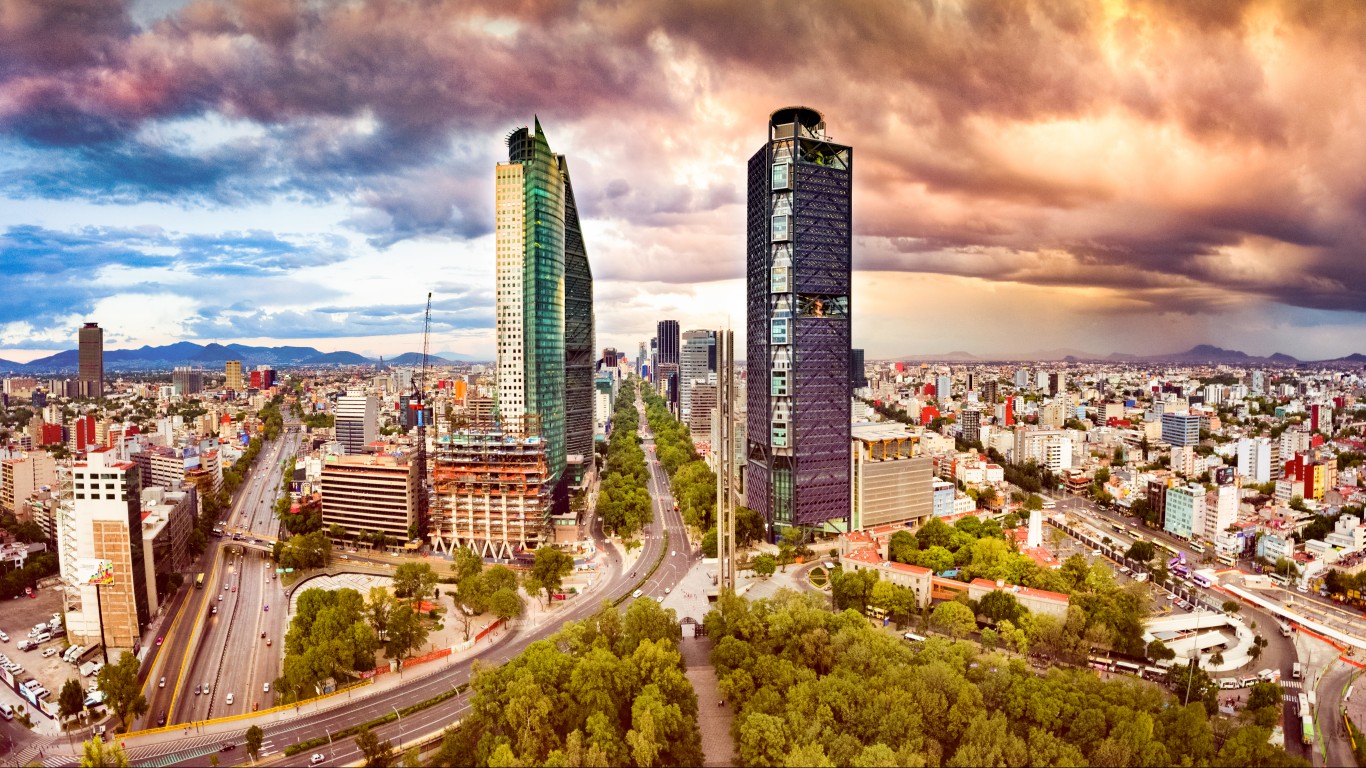
4. Mexico City, Mexico
Mexico City is the most congested city in North America. Drivers in Mexico’s capital spend 218 hours a year in their cars in barely moving traffic, the ninth worst in the world. It takes drivers about seven minutes in the inner city to get through a mile, which is an average speed of about 9 mph. The city has a subway system, but it doesn’t go to areas where the population is growing.
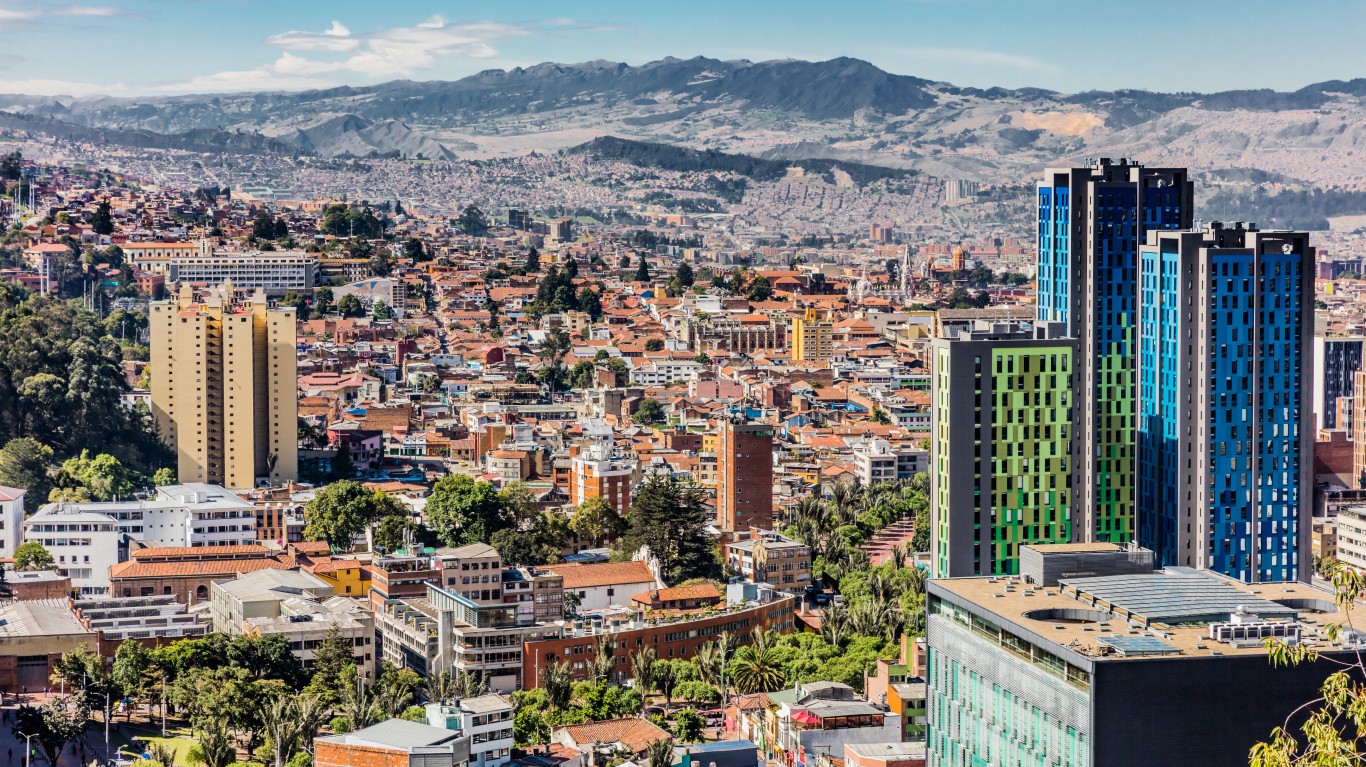
3. Bogota, Colombia
Bogota has the worst traffic in all of South America. Colombia’s capital has the dubious distinction of being the city where drivers waste the most time sitting in traffic, at 272 hours, or more than 11 days, a year. Locals lose more than two full work weeks getting from home to work and back.
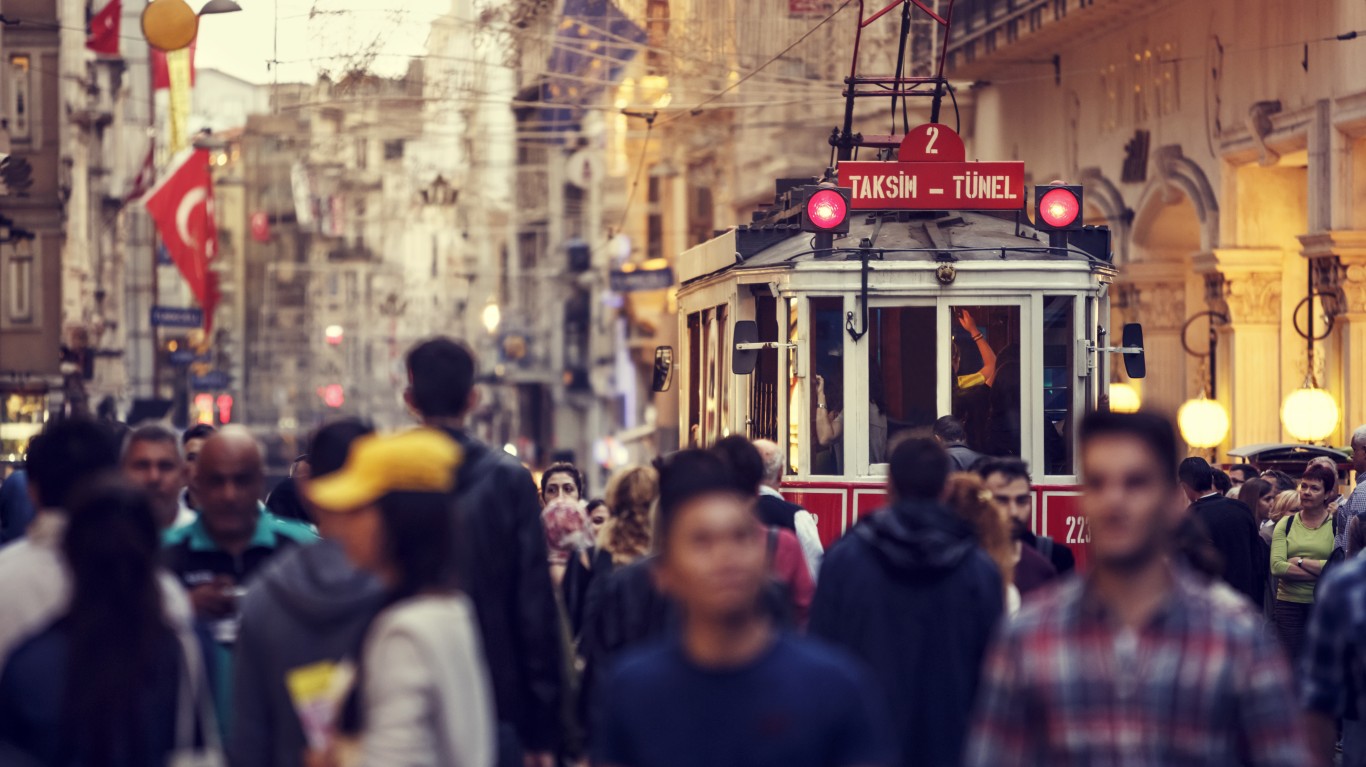
2. Istanbul, Turkey
Istanbul is home to more than 15 million people. The largest city in Turkey has the worst traffic in Eastern Europe and the second-worst in the entire continent. Local drivers sit an extra 157 hours a year in traffic waiting for cars to move.
[in-text-ad-2]
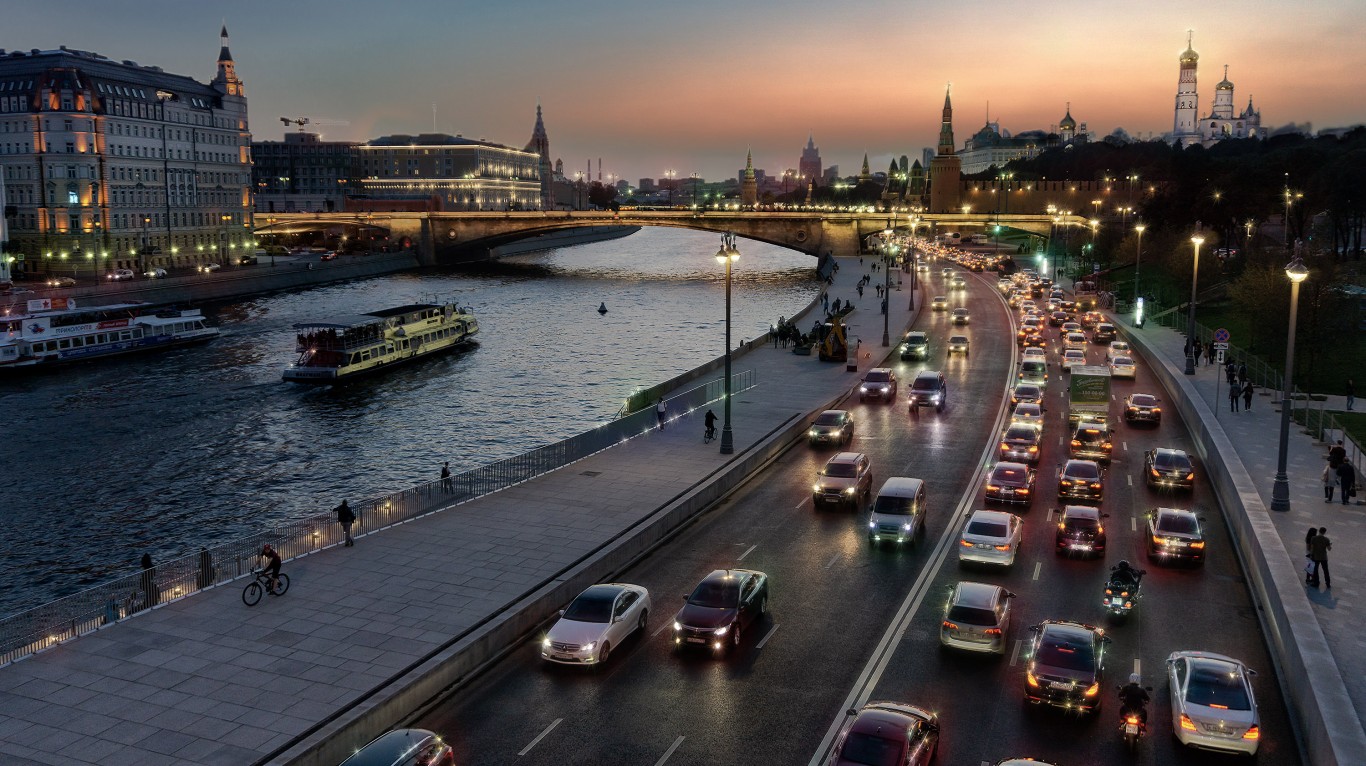
1. Moscow, Russia
The second-most populous city in Europe, after Istanbul, Moscow is a fast-developing metropolis. But the growth has taken a toll on the road system. Drivers in Russia’s capital spend an extra 210 hours a year sitting in traffic, the 10th-longest time in the world. In addition to taking public transport, two potential solutions the Mayor’s Office has offered are raising parking fees and limiting parking spaces.
Retirement can be daunting, but it doesn’t need to be.
Imagine having an expert in your corner to help you with your financial goals. Someone to help you determine if you’re ahead, behind, or right on track. With SmartAsset, that’s not just a dream—it’s reality. This free tool connects you with pre-screened financial advisors who work in your best interests. It’s quick, it’s easy, so take the leap today and start planning smarter!
Don’t waste another minute; get started right here and help your retirement dreams become a retirement reality.
Thank you for reading! Have some feedback for us?
Contact the 24/7 Wall St. editorial team.